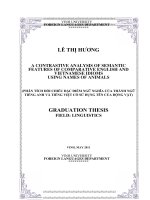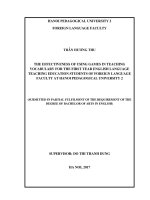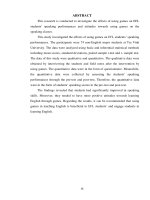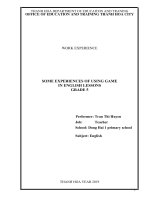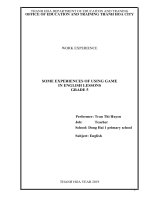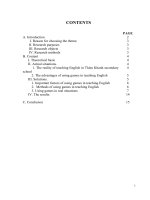A study of using games in efl primary school students vocabulary learning at a foreign language center
Bạn đang xem bản rút gọn của tài liệu. Xem và tải ngay bản đầy đủ của tài liệu tại đây (887.44 KB, 100 trang )
MINISTRY OF EDUCATION AND TRAINING
QUY NHON UNIVERSITY
PHAM THI THANH HUYEN
A STUDY OF USING GAMES IN EFL PRIMARY SCHOOL STUDENTS’
VOCABULARY LEARNING AT A FOREIGN LANGUAGE CENTER
MASTER OF ENGLISH LANGUAGE TEACHING
Binh Dinh – 2023
MINISTRY OF EDUCATION AND TRAINING
QUY NHON UNIVERSITY
PHAM THI THANH HUYEN
A STUDY OF USING GAMES IN EFL PRIMARY SCHOOL
STUDENTS’ VOCABULARY LEARNING AT A FOREIGN LANGUAGE
CENTER
Field: Theory and Methodology of English Language Teaching
Code: 8140111
Supervisor: Bui Thi Dao, Ph.D.
BỘ GIÁO DỤC VÀ ĐÀO TẠO
TRƯỜNG ĐẠI HỌC QUY NHƠN
PHẠM THỊ THANH HUYỀN
NGHIÊN CỨU VỀ VIỆC SỬ DỤNG TRÒ CHƠI TRONG VIỆC HỌC TỪ
VỰNG TIẾNG ANH TẠI MỘT TRUNG TÂM ANH NGỮ
Ngành: Lý luận và phương pháp dạy học bộ môn tiếng Anh
Mã số: 8140111
Người hướng dẫn: TS. Bùi Thị Đào
i
STATEMENT OF AUTHORSHIP
I hereby certify that the thesis titled “A study of using games in EFL
primary school students’ vocabulary learning at a foreign language center”, is
entirely my own original work except where otherwise indicated. I have not used
any sources other than those listed and identified as references. I further declare
that I have not submitted this thesis at any other institution in order to obtain a
degree.
Quy Nhơn, December 2023
Phạm Thị Thanh Huyền
ii
ACKNOWLEDGEMENTS
I would not have been able to complete my thesis without the help of my
supervisor, committee members, and friends, as well as the love and support of
my family.
Foremost, I would like to express my sincere gratitude to my supervisor,
Bui Thi Dao, Ph.D., for the enthusiastic and continuous support of my thesis, for
her patience, encouragement, and immense knowledge. Her guidance helped me
in all the time of research and writing of this thesis. I could not have imagined
having a better advisor and mentor for my research. I would send my special
thanks to all lecturers and staff of the Department of Foreign Languages and the
Department of Pedagogy, Quy Nhon University for their profound knowledge and
guidance during my two years of studying. I am also thankful to all the English
teachers and students at Cherry center for their enthusiastic participation in my
research. Without their help, I would not have been able to complete this paper.
Last but not least, I own a great debt of gratitude to my beloved family whose
support and encouragement have always been a great deal of motivation that has
helped me to overcome all problems to complete my thesis.
iii
ABSTRACT
This study was carried out in the form of an action research which
investigates students’ reactions to the use of games in vocabulary learning and
then figures out whether games in vocabulary teaching could help improve
students’ vocabulary retention. In order to accomplish these purposes, five
teachers and forty five young learners at Cherry Center in Tuy Hoa were selected
to participate in the study. Data collection instruments were employed, namely
students’ and teachers’ questionnaires and interview, class observation in order to
have data to achieve most reliable findings for the research. Results from the
students’ questionnaire and interviews reflected a completely positive attitude of
the students towards the use of games, claiming that game-based activities helped
learning procedure more effectively. The study involved the active participation
of both teachers and students, shedding light on the positive impact of games in
vocabulary learning and providing valuable insights for teachers' instructional
practices. Findings from observation revealed that students had experienced an
improvement in their vocabulary memorization throughout the eight weeks of
study and the reason for the vocabulary retention progress was mainly attributed
to the use of games in language classrooms. Benefits of using games can be listed
as the deeper impression of vocabulary on students’ memory and a more frequent
exposure to vocabulary use. On this basis, some implications for teachers’
preparation, classroom practices and future research were proposed.
Keywords: games, vocabulary learning, students’ reaction, young learners
iv
TABLE OF CONTENTS
STATEMENT OF AUTHORSHIP ........................................................................ i
ACKNOWLEDGEMENTS ...................................................................................ii
ABSTRACT ..........................................................................................................iii
TABLE OF CONTENTS......................................................................................iv
LIST OF ABBREVIATIONS ..............................................................................vii
LIST OF TABLES ..............................................................................................viii
LIST OF FIGURES...............................................................................................ix
CHAPTER 1. INTRODUCTION .......................................................................... 1
1.1. Rationale ...................................................................................................... 1
1.2. Research aims and objectives ...................................................................... 2
1.3. Research questions ....................................................................................... 3
1.4. Scope of the study ........................................................................................ 3
1.5. Significance of the study.............................................................................. 4
1.6. Design of the study ...................................................................................... 5
CHAPTER 2. LITERATURE REVIEW ............................................................... 6
2.1. Introduction to games .................................................................................. 6
2.2. Types of games used for learning vocabulary ............................................. 8
2.3. Overview of primary school students ........................................................ 11
2.4. Characteristics of primary school students in using games for vocabulary
learning.............................................................................................................. 13
2.5. Concepts of vocabulary and the importance of vocabulary ...................... 15
2.6. Previous related studies..............................................................................18
2.7. Summary .................................................................................................... 22
CHAPTER 3. METHODOLOGY ....................................................................... 23
3.1. Research design.......................................................................................... 23
3.2. Research context ........................................................................................ 25
v
3.2.1. Participants...........................................................................................25
3.2.2. Textbook .............................................................................................. 26
3.3. Data collection ........................................................................................... 26
3.3.1. Questionnaires ..................................................................................... 27
3.3.2. Interview .............................................................................................. 29
3.3.3. Observation .......................................................................................... 31
3.4. Data collection procedure .......................................................................... 32
3.5. Research reliability and validity ................................................................ 35
3.6. Summary .................................................................................................... 36
CHAPTER 4. FINDINGS AND DISCUSSION ................................................. 37
4.1. The most frequently used types of games for primary school students'
vocabulary learning...........................................................................................37
4.1.1. Through questionnaire ......................................................................... 37
4.1.2. Through interview................................................................................39
4.1.3. Through observation ............................................................................ 41
4.2. The effective utilization of games in the classroom .................................. 42
4.2.1. Through questionnaire ......................................................................... 42
4.2.2. Through interview................................................................................44
4.2.3. Through observation ............................................................................ 46
4.3. Students’ reactions to games in their lessons ............................................ 48
4.3.1. Through questionnaire ......................................................................... 48
4.3.2. Through interview................................................................................50
4.3.3. Through observation ............................................................................ 54
4.4. Discussion .................................................................................................. 56
4.4.1. The most frequently used types of games for primary school students'
vocabulary learning........................................................................................56
4.4.2. The effective utilization of games in the classroom for enhanced
learning experiences....................................................................................... 58
vi
4.4.3. EFL students’ responses to the use of games to learn English
vocabulary ...................................................................................................... 59
CHAPTER 5. CONCLUSIONS AND RECOMMENDATIONS ....................... 63
5.1. Conclusions ................................................................................................ 63
5.2. Limitations of the study ............................................................................. 65
5.3. Suggestions for further research ................................................................ 66
REFERENCES ..................................................................................................... 69
APPENDICES
vii
LIST OF ABBREVIATIONS
EFL: English as a Foreign Language
SLA: Second language acquisition
ESL: English as a Second Language
viii
LIST OF TABLES
Table 3.1. Students’ Demographic Information ................................................. 25
Table 3.2. Procedure for data collection ............................................................. 33
Table 4.1. Students’ games in learning vocabulary ............................................ 38
Table 4.2.How to teach vocabulary in games to primary students ..................... 43
Table 4.3. EFL students’ responses for using games in English language learning
............................................................................................................................. 48
ix
LIST OF FIGURES
Figure 4.1. Students’ reactions to the use of games in the classroom ................ 50
Figure 4.2. Students’ shyness in classroom games ............................................. 53
1
CHAPTER 1. INTRODUCTION
This chapter begins by discussing the use of games in teaching and learning
in the context of education around the world and in Vietnam. It then describes the
rationale for the study, the research aims and objectives, and the research
questions. This is followed by the scope and the significance of the study. Finally,
there is an overview of the organization of the study.
1.1. Rationale
It is believed that vocabulary is one of the language components that play a
significant part in the development of language skills. Building up useful
vocabulary is important to the teaching and learning progress of a foreign
language. Limited vocabulary; therefore, is likely to be a barrier for students in
their foreign language learning. For this reason, vocabulary is highly important to
any language. Whether learners are adults or young children, they need to broaden
their own vocabulary. Insufficient vocabulary may become a long-term problem.
In fact, to learn English vocabulary, memorization is very important for the
learners. As Thornbury (2002) stated that in mastering English vocabulary, the
students do not only need to learn a lot of English words but also to remember
them (p. 23). Accordingly, low proficiency makes students find it difficult to
acquire the language knowledge and take part in class activities. It is clear that
they could not communicate well because they lack the words they need. As the
importance of mastering vocabulary is obvious, the teaching of vocabulary should
always receive high attention. However, the traditional vocabulary teaching
techniques in such a way as presenting new words on blackboard together with its
phonics, meaning which lead to the inefficiency of vocabulary retention,
2
especially to young learners. How words should be learnt attracts a lot of
discussion from many influential experts. Adam (2015) suggested that games
should be included in these courses since they give students the chance to practice
their language skills and acquire self-assurance in their new abilities.
This learning material has become much more powerful than ever before;
that is the reason why teachers can make use of it in learning a foreign language.
This study aims to explore types of games to teach young learners and to
investigate students’ reactions to the use of games to learn vocabulary. Hence,
employing action research as the chosen methodology would be a suitable
strategy. This approach involves the teacher, who is also the researcher,
investigating the classroom environment, implementing specific teaching
techniques within a particular class, and identifying solutions for any challenges
encountered during the English teaching and learning process. By adopting action
research, this study aims to gain a deeper understanding of the teaching and
learning dynamics in the English classroom and contribute to the development of
effective instructional practices. For these purposes, I want to conduct a research
about students’ vocabulary by the title, “A study of using games in EFL primary
school students’ vocabulary learning at a foreign language center.”
1.2. Research aims and objectives
The study aims to provide types of games used for vocabulary learning in
an English center in Tuy Hoa, Phu Yen. Then, to some extents, to explore student’s
reactions in the class in order that teachers have some suitable methods to teach
students effectively.
To be more specific for the aim of the research, this study has been carried
out to explore:
3
- To explore types of games that used for students’ vocabulary learning
- To explore how games effectively used in the class.
- To explore how students react to games in learning vocabulary.
1.3. Research questions
In an attempt to achieve the above-presented aims, the study seeks to answer
the following research questions:
1. What types of games are the most frequently used for students’
vocabulary learning?
2. Which types of games can be used effectively in the class?
3. What are students’ reactions to games in their lessons?
1.4. Scope of the study
This research focuses on examining the impact of games on vocabulary
learning at Cherry English Center and exploring students' perception of using
games for vocabulary acquisition. Due to the limitations in terms of time and
scope, this study will specifically discuss the utilization of selected games from
gamestolearnenglish.com as a means of teaching vocabulary to primary school
students, specifically those in 4th and 5th grades. These grades were chosen as
they exhibit higher engagement levels compared to 1st, 2nd, and 3rd grades.
Additionally, five English teachers who teach 4th and 5th graders at Cherry
English Center will be interviewed to gain further insight. To accommodate the
time constraints and the length of the study, a total of forty-five students between
the ages of nine and eleven, who attend Cherry English Center in Tuy Hoa, will
participate in the research. The study will span eight weeks and aims to investigate
effective approaches to vocabulary learning through games, considering that
4
primary students may not be able to fully respond to all the research questions due
to their young age. The primary participants in the study will be the students
themselves, while the input of the English teachers at Cherry English Center will
be sought through interviews and questionnaire to gather additional perspectives.
1.5. Significance of the study
It is hoped that this study may provide some insights in both theoretical and
practical significance. The literature review on the reaction to games on
vocabulary learning can be said that games are an effective and motivating way to
teach vocabulary in classes. The findings of this study are anticipated to contribute
to learning the ways to learn vocabulary so that primary school students can learn
English effectively. Moreover, the findings of this study have the potential to make
a meaningful contribution to the field of language education, offering practical
implications for enhancing vocabulary learning strategies, particularly for primary
school students.
As the findings show, games can be effective in vocabulary acquisition. The
current findings show that games, due to creating an interactive and motivating
context as well as using games where learners can easily and subconsciously share
their information, and also due to the requirements and obligations encountered
by them during playing, are effective in vocabulary acquisition. The subjects
acquire the new words via the games because they are willing to be the winner and
get gifts or marks from the teachers. They compete and cooperate with each other
in an enjoyable environment to be the winners in these games.
5
1.6. Design of the study
The thesis consists of five chapters:
Chapter 1, Introduction, presents the rationale, the aims, the research
questions, the scope and the design of the study.
Chapter 2, Literature Review, presents theories related to vocabulary and
games. Previous studies on games are also reviewed.
Chapter 3, Methodology, presents the research methods, the setting of the
study, the participants, the research data and the research procedures.
Chapter 4, Findings and Discussion, presents the findings of the study and
some explanations, and comments on these findings.
Chapter 5, Conclusion, provides the pedagogical implications, some
limitations of the study and suggestions for future study.
6
CHAPTER 2. LITERATURE REVIEW
This chapter has introduced theoretical aspects of vocabulary learning in
EFL contexts and the potential benefits of using games as a teaching tool with the
aim of providing a theoretical background to this study. The chapter also provides
previous studies related to the present research.
2.1. Introduction to games
According to Rogers (1981), gaming is a goal-defined, rule-governed, and
competitive activity with a resolution that engages pupils. For instance, Hadfield
(1998) describes a game as “an activity with rules, a goal, and an element of fun.”
(p.4). In this research, the game is defined as a purposeful, enjoyable activity that
is subject to rules. There are various ways to categorize language games.
Participation in games necessitates both teamwork and rivalry with other
individuals or teams. Young learners must repeat patterns and use language while
playing in order to grow and enhance their skills.
According to Lewis & Bedson (1999), game is developed in order to
improve the outcomes of the teaching and learning process of a new language.
Teachers who use games believe that it is important for students to benefit from
their experience learning to communicate in a foreign language. Lewis & Bedson
(1999) further explains that young learners can talk before, during, and after the
game in an environment that fosters meaningful communication. The desire in
incorporating more game-based learning into educational processes has grown as
the corpus of studies highlighting the potential educational value of games has
grown as claimed by Wastiau, Kearney & Van de Berghe (2009). Games' inherent
educational value is frequently emphasized in discussions of the subject, such as
7
their immersive character or their capacity to support player domain mastery
through scaffolding and flow-inspiring designs as retried by (Annetta, (2008) &
Gee, (2009)).
As Egenfeldt-Nielsen (2010) & Linehan et al., (2011) stated, although the
educational benefits of games are frequently praised, there aren't many examples
of games being used in classrooms. They further descirbed that this mismatch in
the game-based learning community has previously been attributed to the general
aversion of educators to video games. In educational settings, games can be
utilized to make learning more enjoyable, motivating, and effective. They also
provide opportunities for students to actively participate, apply knowledge and
skills, and collaborate with their peers. Games can be designed to target specific
learning objectives, such as improving problem-solving abilities, enhancing
critical thinking skills, or reinforcing subject knowledge.
In addition to being able to supervise and support students' gaming
activities, the teachers must be able to ensure that game sessions operate smoothly
from an administrative standpoint. Being a game tutor for students involves the
teacher in a number of duties, and given the differences in each student's abilities
and interests, this role can be challenging.
Richard and Brian (2010) claimed that educational games can have a
positive effect on learning outcomes. Specifically, they discovered that students
who engaged in educational games performed better in terms of knowledge
acquisition, and transfer of learning compared to students who received traditional
instruction without game-based elements. They also identified several factors that
contribute to the effectiveness of educational games. These factors include
providing clear learning objectives, offering instructional support within the game,
8
integrating relevant content and gameplay, and ensuring that the game aligns with
the learning goals and curriculum.
2.2. Types of games used for learning vocabulary
Lewis & Bedson (1999) give a similar classification. Some of the games
mentioned above can be categorized under a broader umbrella term, such as “task-
based games” (typically pairs or groups work on meaningful tasks in the way they
enjoy; learners obey clear rules and they have the opportunity to practice all
language skills) or "movement games" (the type of game when learners are
physically active, such as “Find your partner”).
As Wright, Betteridge, & Buckby (2005) stated games, as stated before, are
interesting methods to teach young learners vocabulary. Young language learners
can benefit from the usage of games. They keep students engaged and make
learning enjoyable. Additionally, when language training turns serious and
lifeless, games can elicit emotions (Bransford, Brown, & Cocking, 2000; Ersoz,
2000). The games that will be discussed in this section are retried from
gamestolearnenglish.com such as Word search, Hidden picture game, Hangman,
Slap the board, etc.
Sorayaie (2012) also explains that games give teachers the chance to
immerse students’ interactive and immersive knowledge, judgment, and abilities.
Learning environments can be debatable; their connection to pleasure and
enjoyment is frequently viewed as non-educational. Nevertheless, Sorayaie (2012)
further stated that there is a growing cultural acceptance of gaming. Games are
investigated to aid students' learning as part of the modern educational
development trend. Teachers undoubtedly already know that young students
rapidly get bored if they teach English to children. So how can teachers stimulate
